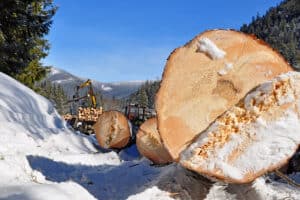A buyer’s market exists today for much of our real estate. Too many properties for sale and not enough buyers have cut asking prices in some — but not all — urban and suburban markets.
Buyers are advantaged in a buyer’s market, except when they can’t buy. With our economy producing less and energy costing more, buyers are wary. The pinch on mortgage money in distressed housing markets keeps them sidelined.
Country property — farms, undeveloped land, upscale second homes and timberland — does not look like a buyer’s market. Asking prices in most places appear to be holding their own, and are trending up in certain markets.
My completely unscientific look through the listings of the major country-property websites shows asking-price strength in most areas. Selling prices and sales may be off here and there, but I couldn’t determine that from the asking prices.
Ryan Folk, who runs www.landflip.com, sees it a little differently. He writes: “What we are seeing is a slight drop in land prices especially in the Southeast where supply has outpaced demand. It appears prices are falling where sellers have been caught at the wrong end of speculation. In other words, they have to sell or the bank is knocking on the door. However, the stable seller is holding firm on his price and willing to hold out for a market shift in his favor. What is selling? Small home-site/retirement tracts under 20 acres…[and] very large, beautiful farms, ranches and plantations. Medium size, 100-to-500-acre recreational tracts with little or no income in the $300k-$1 million range are sitting.”
Emily S. Wilson — an agent with Bob Parks Realty, LLC in Shelbyville, Tennessee, south of Nashville — told me “…homes with acreage are selling better than homes in subdivisions in our Middle Tennessee area. We sell a lot of horse farms and high=dollar properties, and them that have…still want more, but if I were depending on starter home sales for a living, I’d be crying hard times. Instead, our company sales are up $1 million over this same time last year.”
Farm prices are strong due to the spike in crop prices and the longer term upward trends for farmland and commodities.
Despite weakness in wood markets, timberland keeps appreciating. Third-party investors of the Hancock Timber Resource Group bought 900,000 acres in Louisiana, Texas and Arkansas for an average price of $1,900 per acre from TimberStar Southwest in April that had been purchased from International Paper 17 months earlier for an average of $1,322. That’s a 44 percent increase.
Small wooded tracts with fewer than 100 acres east of the Mississippi River are for the most part appreciating, driven more as second-home sites than as recreation or timberland investments.
My impression is that country prices are not eroding, but sales may not be as active as a year ago.
Several factors explain why country prices have been less affected by the factors that are holding down — some would say, “correcting” — certain urban and suburban markets.
First, wealthy buyers have cash flow and savings that float them past economic turbulence. Foreclosures, interest-rate adjustments and tight credit have fallen harder on middle- and lower-income groups than on our top 20 percent who are still buying because they still can. Buyers of large investment tracts, farms and upscale vacation homes have not seen their circumstances, as a group, sour over the last year.
Strong land prices, however, can back out middle-income buyers. The small tracts Folk mentioned appeal to middle-class urban/suburban buyers who would have bought 50 acres five years ago, but now settle for 20 or 30 at the same money.
Second, problem loans and foreclosures are concentrated in a handful of very large lenders who serve metropolitan areas. Country lenders tended to stick to conventional lending standards that fit the property and the borrower. They are not in trouble. Reasonable mortgage money continues to be available out here through local banks, farm credit coops, insurance companies, credit unions and sellers.
Third, country property of all types has generally proven to be a steadily appreciating asset with many tax benefits. Investors, big and small, have seen dirt do better than stocks and other investments.
Still, some country sellers do need buyers to help them sell their property.
Brokers representing sellers sometimes encourage buyers to become “better buyers” by offering a “five-star contract”: 1) full price, 2) all cash with no financing contingency, 3) no other contingencies or inspections, 4) large deposit and 5) closing within 30 days.
Brokers representing buyers might suggest different ideas, including:
Know the local market. Buyers need to know whether a specific property is priced above, at or below market value. A broker or agent who’s working for the buyer can do a market analysis or, at the minimum, offer an informed opinion.
An independent appraisal will provide an unbiased assessment of the property’s value based on recently sold comparable properties. The buyer should ask the appraiser to include an opinion as to how the property is priced in relation to the current market. Buyers can sometimes benefit by introducing an appraisal into negotiations with sellers.
Know your own range. Establish your comfortable price range with your accountant before looking. Neither the back of an envelope nor Madam Voodoo who looks into a glass ball for a living is your accountant. You can buy above your price range only if you can quickly sell some asset from the purchased property.
Know your own price. The buyer’s price is not set in relation to the seller’s asking price. The buyer’s price is what the property is worth to the buyer in light of his resources, the property itself and the buyer’s plans. The buyer needs to develop a buyer’s price for each target property. In some circumstances, a buyer can make simultaneous offers on two or even more properties with appropriate get-out language in each offer. The most accommodating seller wins the sale.
Don’t be a tire-kicker. Looking is work, not Saturday-afternoon amusement. Neither agents nor sellers should be expected to waste time with a buyer who is not prepared and serious. My wife and I once postponed a trip to show our property to a buyer who announced after a three-hour tour that he “wasn’t interested in buying anything but always liked to see what was around.” My wife, who comes from an old and good family in Charlotte, was more gracious than I was in response.
Get organized. A buyer should be pre-approved by at least one lender before visiting anything. Inform the seller that you are pre-approved.
Know what you’re looking at—soil types, floodplain, merchantable timber (which can be sold immediately), good land from bad, north from south, sound construction from jack-leg. Be prepared to move quickly, but never impulsively.
Appraise the seller. Some sellers want to sell, but don’t want to negotiate. Others price their property above its value then treat buyers like skunks at a picnic. These sellers find some odd reward in feeling victimized by buyer reaction to their own behavior. In most cases, a buyer should walk away from a take-it-or-leave-it seller.
MIT economist Dan Ariely, author of Predictably Irrational: The Hidden Forces That Shape Our Decisions, says that sellers overvalue and fall in love with what they own, and then focus on what may be lost in a sale rather than what will be gained. A buyer may find a way to introduce Ariely’s ideas into negotiations.
The more a buyer knows about why a seller is selling and the intensity of his motivation, the more likely a deal.
Learn how to negotiate. Read up on negotiating real estate. You’re aiming for a sensible deal for you, not necessarily a bad deal for the seller. Look through George Fuller’s, The Negotiator’s Handbook, George F. Donohue’s Real Estate Dealmaking, and Peter G. Miller’s Successful Real Estate Negotiation.
This content may not be used or reproduced in any manner whatsoever, in part or in whole, without written permission of LANDTHINK. Use of this content without permission is a violation of federal copyright law. The articles, posts, comments, opinions and information provided by LANDTHINK are for informational and research purposes only and DOES NOT substitute or coincide with the advice of an attorney, accountant, real estate broker or any other licensed real estate professional. LANDTHINK strongly advises visitors and readers to seek their own professional guidance and advice related to buying, investing in or selling real estate.









Ryan – I have a home on 20 acres on a 14 acre lake, gated community outside of Birmingham, AL . I have been unable to sale and have fallen behind in payments. Is there anything to do to keep this from foreclosing? . Is a short sale a possibility? Thank you Randy Davis 205-335-0259
Hi Randy. How are you marketing the propertty? Is it listed? How does the price compare with recent sales. Recent sales most likely don’t line up with the current market. If nothing is selling, how can you get recent sales to determine what your property is worth today? Hard to do. In today’s market, price is everything!
Great article Curtis and thanks for the quote! You mention some excellent suggestions for land buyers to study.
As a Realtor and Forester I think land values have suffered somewhat n the case of developers are no longer able to pay premium price to develop, if buying at all. We see in our business and on the web site Land Incorporated a lot on interest in homes with some land and commercial or income producing land to some extent, but raw acreage interest is down. Timber values drive timberland prices and is a reflection of that market which as suffered in regard to saw-timber values. Exports have helped some timber values such as pulp to Far East etc. However, land values have not seen the extreme drops of the stock market and with single family housing in regard to foreclosures. Land tends to ride out the up and downs and offers a more secure risk buffer for investments. All markets have swings up and down and so does land values but the extremes are usually less.
George Farmer